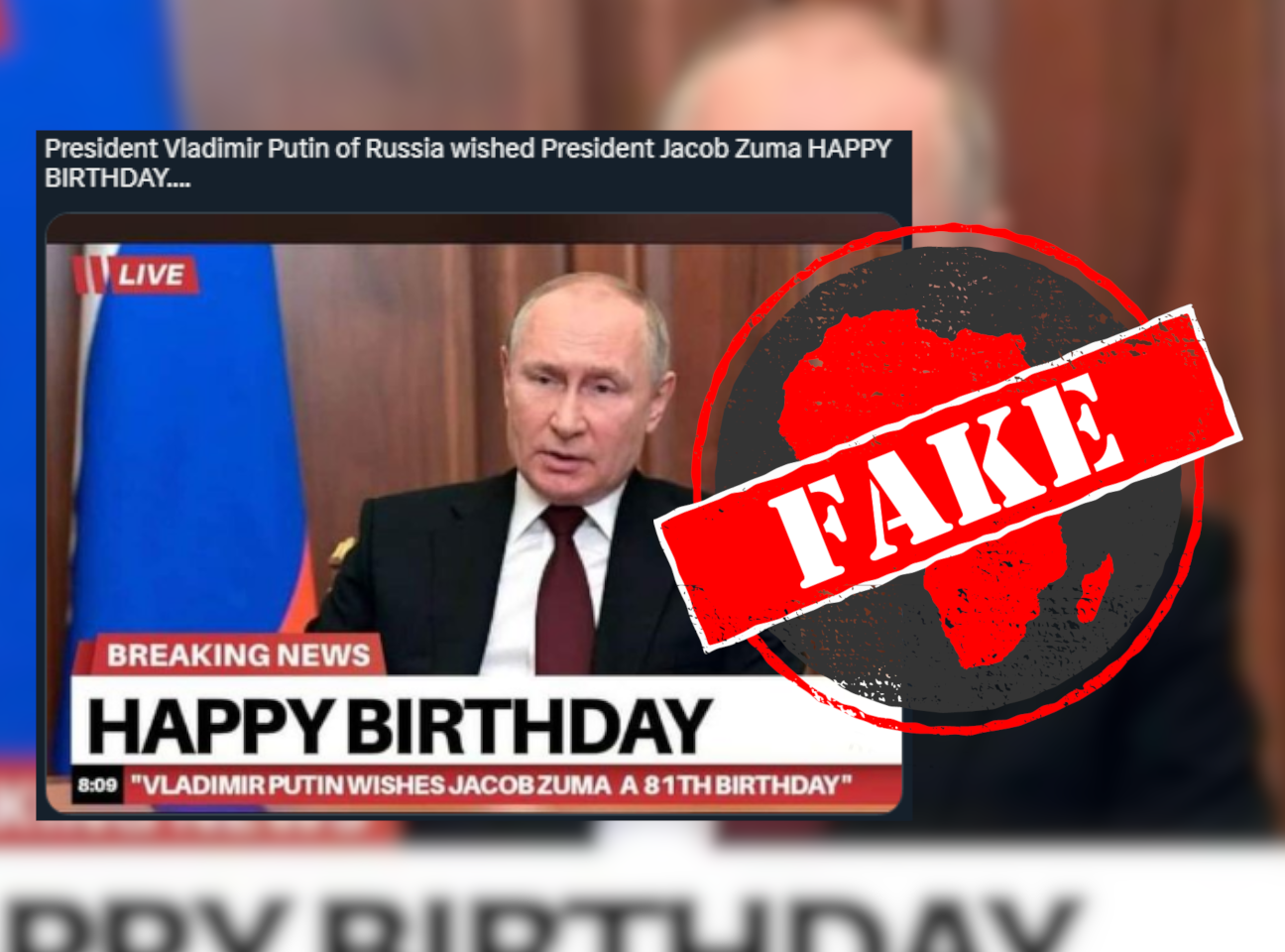IN SHORT: Much has been made of the South African government’s close ties to Russia following news that the country will host Russian president Vladimir Putin in 2023. But images suggesting Putin congratulated former president Jacob Zuma on his birthday – on live TV – are fabricated.
An image posted to social media in April 2023 claims to show Russian president Vladimir Putin wishing former South African president Jacob Zuma happy birthday in an announcement on live TV.
The image was viewed here nearly 36,000 times, and was also posted by various other accounts, here, here, here and here.
Some social media posts also made the same claim without using the photo, including a tweet from Duduzile Zuma-Sambudla, one of Zuma’s daughters.
But upon closer inspection, the image is clearly fake. Here’s why.

Russia-South Africa relations under Zuma
Jacob Zuma, controversial president of South Africa from 2009 to 2018, has had a long relationship with Putin and Russia. Recently, amid the continuing invasion by Russia of Ukraine, Zuma reportedly called Putin “a man of peace”.
Russia backed South Africa’s anti-apartheid liberation movement, which included Zuma’s political party, the now ruling African National Congress.
The South African government says it was the first African state to recognise Russian Federation independence. Russia and South Africa officially established diplomatic ties in 1992.
Zuma’s links with Russia go back to his training in the Soviet Union during the anti-apartheid struggle. Under his presidency, South Africa and Russia became part of what is known as the BRICS group of countries – Brazil, Russia, India, China and South Africa.
Zuma and Putin also reportedly attempted to sign a nuclear deal in secret, which was later stopped.
An ‘81th Birthday’ and other clues the image is fake
Despite these links, there is no evidence the Russian president congratulated Zuma on live TV on his 81st birthday on 12 April 2023, as the image suggests.
The first red flag is in the image itself. It is formatted to look like a screenshot from a live TV news address by Putin. It features an apparent “breaking news” strapline that reads “VLADIMIR PUTIN WISHES JACOB ZUMA A 81TH BIRTHDAY”, including quotation marks.
The language errors – “81th” instead of the correct “81st” – should be cause for concern and further investigation. You would also not expect quotation marks used like this on TV.
For more tips, read our guide on verifying breaking news stories.
Reverse image search is your friend
We used a reverse image search to find out more about this image. You could use a tool like Tineye to search the web for other versions of this image and use Google Lens to find more information. If an image has been edited, sometimes more results appear if you crop the image, which you can do directly through Google Lens.
Searching Tineye revealed many instances of the same photograph of Putin, but without the news headline banner at the bottom of the image. These were found on various news and other websites starting from February 2022, and not April 2023.
Navigating to some of these sites revealed that the photos came from an address Putin gave in February 2022. He was speaking about his decision to recognise the independence of key Ukrainian separatist regions, days before the Russian invasion began. He did not mention Zuma in this address or wish him happy birthday.
The image circulating on social media has been digitally manipulated to look like a screengrab from a TV broadcast. But it is not.
Republish our content for free
For publishers: what to do if your post is rated false
A fact-checker has rated your Facebook or Instagram post as “false”, “altered”, “partly false” or “missing context”. This could have serious consequences. What do you do?
Click on our guide for the steps you should follow.
Publishers guideAfrica Check teams up with Facebook
Africa Check is a partner in Meta's third-party fact-checking programme to help stop the spread of false information on social media.
The content we rate as “false” will be downgraded on Facebook and Instagram. This means fewer people will see it.
You can also help identify false information on Facebook. This guide explains how.


Add new comment